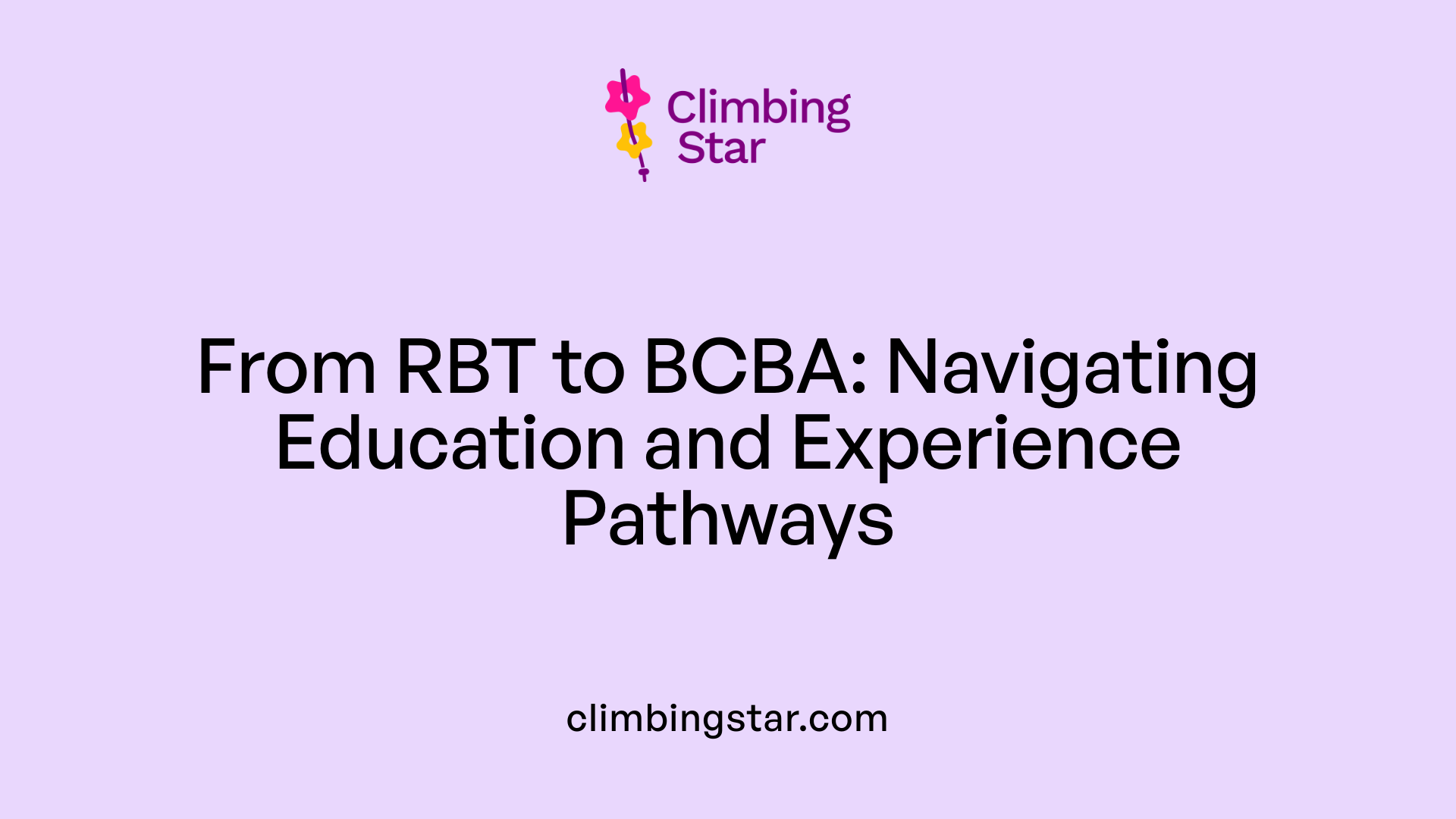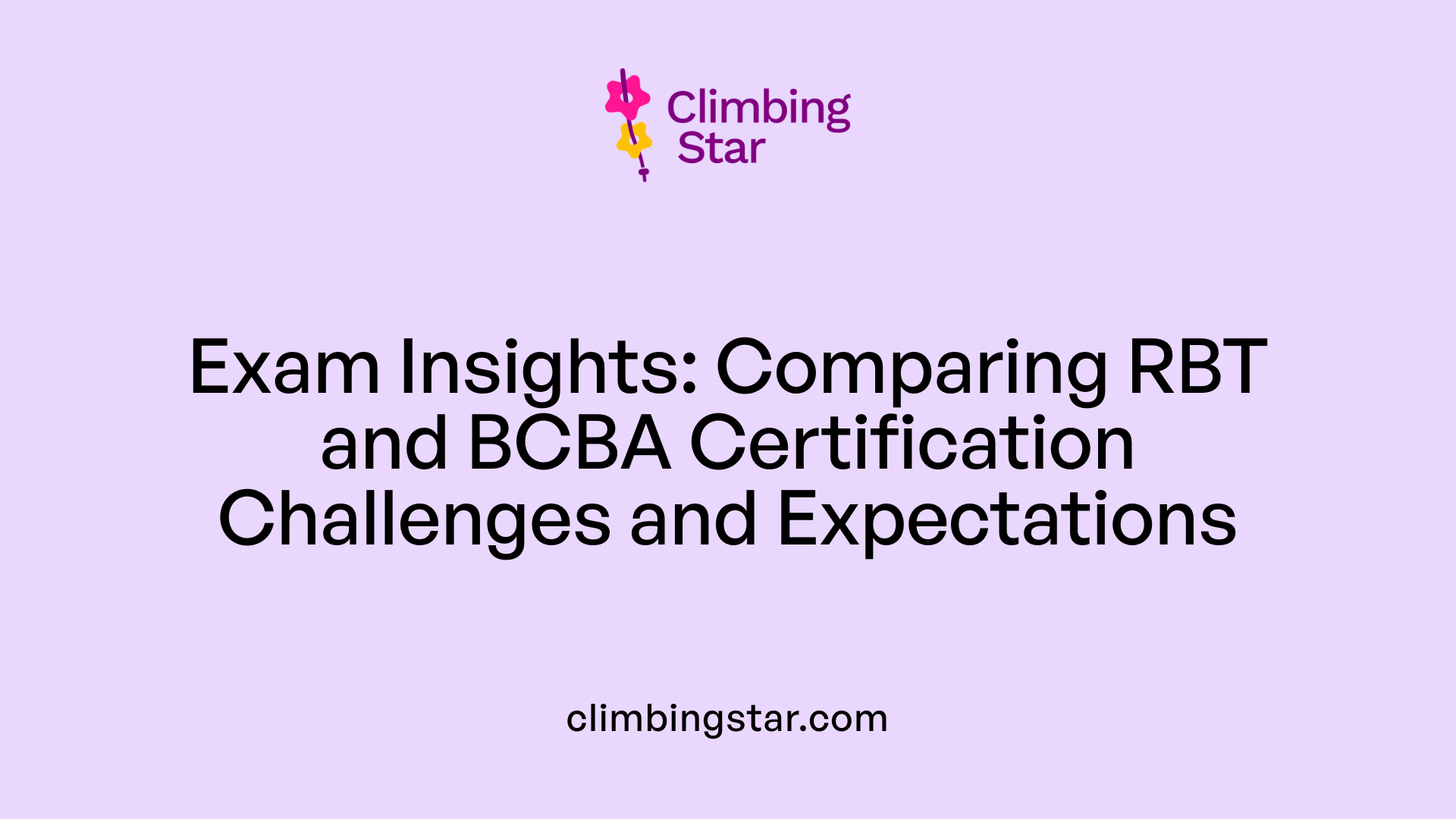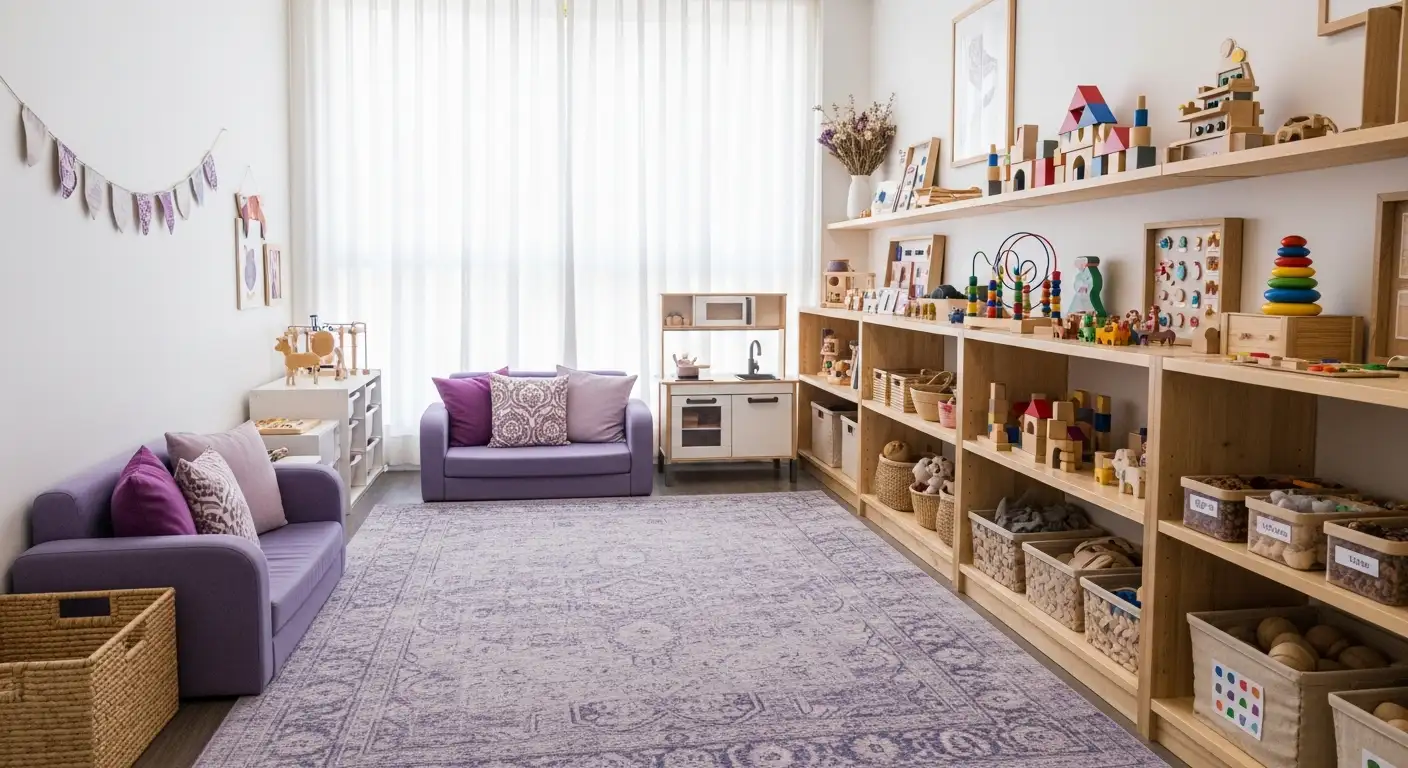Exploring Career Growth in Applied Behavior Analysis
In the field of Applied Behavior Analysis (ABA), professionals at varying certification levels contribute uniquely to therapy and interventions, particularly for individuals with autism. A common question arises among Registered Behavior Technicians (RBTs): can they advance their careers and become Board Certified Behavior Analysts (BCBAs)? This article explores the certification requirements and progression paths, illuminating how RBTs can evolve professionally into BCBAs, alongside the training, supervision, and educational commitments required.
Understanding the RBT Credential and Foundation in ABA Therapy

What are the basic requirements to become an RBT?
To become a Registered Behavior Technician (RBT), candidates must be at least 18 years old and have a high school diploma or equivalent. Additionally, passing a criminal background check is mandatory before advancing in the certification process. These prerequisites ensure individuals are prepared and eligible for the responsibilities involved in ABA therapy.
What training and assessment are involved in obtaining RBT certification?
RBT candidates must complete a comprehensive 40-hour training course aligned with the latest RBT Task List. This course must include at least three hours devoted to ethics and professional conduct. Training can be delivered online or in person by qualified professionals such as Board Certified Behavior Analysts (BCBAs) or Board Certified Assistant Behavior Analysts (BCaBAs).
After training, candidates undergo an RBT Competency Assessment led by a BCBA. This assessment includes direct observation and role-playing scenarios to evaluate practical skills.
Finally, candidates must pass a 75-question multiple-choice exam administered through Pearson VUE. The exam covers essential topics like behavior assessment, behavior reduction strategies, documentation, measurement, professional conduct, and skill acquisition.
What is the scope of practice for RBTs?
RBTs work under the direct supervision of BCBAs or BCaBAs and assist in providing applied behavior analysis (ABA) therapy, commonly serving individuals with autism. They perform behavioral interventions, data collection, and support therapy plans created by their supervisors.
To maintain certification, RBTs must receive ongoing supervision amounting to at least 5% of their service hours monthly, including at least two face-to-face sessions (in person or via videoconferencing). This supervision ensures adherence to protocols and facilitates continuous professional development.
| Aspect | Description | Additional Notes |
|---|---|---|
| Age and Education | At least 18 years old with a high school diploma or equivalent | Basic eligibility requirement |
| Background Check | Mandatory before exam scheduling | Ensures candidate suitability |
| Training | 40-hour course including 3+ hours on ethics | Delivered by BCBAs or BCaBAs, online or in person |
| Competency Assessment | Direct observation and role-play evaluation | Administered by a BCBA |
| Exam | 75 multiple-choice questions | Covers key ABA topics; minimum 80% passing score |
| Supervision Requirements | 5% of service hours monthly; 2 face-to-face sessions | Supports practical fidelity and professional growth |
| Scope of Practice | Behavior intervention implementation under supervision | Key role in ABA therapy for individuals with developmental needs |
Supervision and Professional Development for RBTs

How is supervision conducted for RBTs?
Registered Behavior Technicians (RBTs) are required to have ongoing supervision from qualified professionals, typically Board Certified Behavior Analysts (BCBAs) or Board Certified Assistant Behavior Analysts (BCaBAs). This supervision must total at least 5% of their monthly service provision hours, ensuring they receive focused and consistent guidance.
What are the monthly supervision hours and formats?
Supervision includes a minimum of two face-to-face sessions each month. These interactions can occur in person or through videoconferencing platforms, making it flexible to accommodate different work settings such as schools, clinics, and homes where RBTs often provide Applied Behavior Analysis (ABA) therapy.
Why is supervision important for quality assurance?
Supervision plays an essential role in maintaining the quality of behavioral interventions delivered by RBTs. It supports continuous professional development, verifies that interventions adhere to established behavioral protocols, and provides an opportunity for mentors to observe and guide RBTs directly through various techniques, including role-playing and direct observation. This oversight ensures ethical and effective service delivery, ultimately benefiting the individuals receiving support.
This structured supervision framework reinforces the RBT's role within a team led by BCBA-level professionals while safeguarding high standards of care in behavioral services.
The Role and Responsibilities of a BCBA in ABA Therapy

What qualifications are required to become a BCBA?
Board Certified Behavior Analysts (BCBAs) are highly qualified professionals who must earn a graduate-level degree, typically a Master's or Doctorate, in psychology, education, or behavioral analysis. Their education involves completing at least 270 hours of specialized coursework relevant to behavioral science. Additionally, candidates must accrue supervised fieldwork experience, which ranges from 1,500 to 2,000 hours, ensuring hands-on practice under qualified supervision. The final step is passing a comprehensive certification exam covering behavioral analysis principles, experimental design, and behavior change techniques.
Scope and depth of the BCBA role
BCBAs bring deep expertise to Applied Behavior Analysis (ABA) therapy, working closely with individuals often diagnosed with developmental disabilities such as autism. Their role includes designing, implementing, and overseeing behavior intervention plans, conducting assessments, interpreting data, and training other professionals and caregivers. BCBAs ensure that interventions are evidence-based and tailored to individual needs, adapting strategies as progress is monitored.
Distinct responsibilities compared to RBTs
Unlike Registered Behavior Technicians (RBTs), who primarily carry out direct ABA therapy sessions under supervision, BCBAs hold a supervisory and clinical leadership position. BCBAs are responsible for developing treatment plans, supervising staff including RBTs, and ensuring ethical practice standards. This distinction underscores the BCBA’s advanced expertise and their role in guiding therapy direction, while RBTs provide valuable hands-on assistance implementing those plans.
The Educational and Fieldwork Journey From RBT to BCBA

What is the pathway in education and experience for an RBT to become a BCBA?
Transitioning from an RBT (Registered Behavior Technician) to a BCBA (Board Certified Behavior Analyst) involves a significant investment in advanced education and practical experience.
Graduate Degree Requirements
An aspiring BCBA must first obtain a graduate degree—either a Master's or a Doctorate—in a relevant field such as psychology, education, or behavioral analysis from an accredited university. This degree provides the foundational knowledge required to understand complex behavioral principles and interventions. The program must include at least 270 hours of graduate coursework specifically related to behavior analysis.
Supervised Fieldwork Specifics
In addition to coursework, candidates must complete substantial supervised fieldwork. This involves either 2,000 hours of general supervised experience or 1,500 hours of concentrated supervised fieldwork. The supervision must be rigorous, with protocols in place to maintain the quality of mentorship and ensure adherence to professional standards. Throughout this process, candidates learn to apply behavioral techniques effectively under the guidance of experienced supervisors.
Time and Experience Commitment Needed
The entire pathway demands considerable dedication. Graduate programs typically take two or more years to complete, and accumulating the required supervised fieldwork hours can extend the timeline depending on the candidate’s pace and availability. This journey not only deepens the candidate’s expertise but also refines their practical skills, preparing them for the responsibilities of a BCBA.
Together, these elements create a comprehensive educational and experiential framework, guiding RBTs through a structured progression toward advanced certification and expanded professional roles within the field of applied behavior analysis.
Certification Exams: Contrasting RBT and BCBA Requirements

Exam formats and content
The Registered Behavior Technician (RBT) certification exam consists of 75 multiple-choice questions to be completed within 90 minutes. It focuses on practical areas such as assessment, behavior reduction, documentation, measurement, professional conduct, and skill acquisition, ensuring candidates are prepared for direct application in ABA therapy settings.
In comparison, the Board Certified Behavior Analyst (BCBA) exam is more extensive, consisting of 160 questions. This exam delves deeper into behavioral analysis principles, experimental design, and behavior change procedures, reflecting the advanced graduate-level training required for BCBA candidates.
Passing criteria
To pass the RBT exam, candidates must achieve a minimum score of 80%. The exam is administered through Pearson VUE testing centers, and candidates must also complete a criminal background check before scheduling.
The BCBA exam also requires a passing score but is known to be more challenging due to its broader and deeper content scope linked to graduate-level standards.
Differences in exam difficulty and scope
The primary differences between the RBT and BCBA exams lie in their scope and complexity. The RBT exam is designed to assess foundational competencies for paraprofessionals working under supervision. In contrast, the BCBA exam evaluates comprehensive knowledge required to independently design and supervise behavioral interventions, necessitating advanced academic preparation and supervised fieldwork.
| Aspect | RBT Exam | BCBA Exam | Notes |
|---|---|---|---|
| Number of Questions | 75 | 160 | BCBA exam is over double in length |
| Time Allotted | 90 minutes | Varies (typically around 4 hours) | BCBA exam requires more extensive testing time |
| Content Focus | Practical skills, ethics, assessment | Behavioral analysis principles, experimental design, behavior change | BCBA content is broader and more theoretical |
| Passing Score | 80% minimum | Required, more stringent passing standards | Reflects graduate-level rigour |
| Exam Delivery | Pearson VUE centers | Pearson VUE centers | Both exams are computer-based and securely proctored |
These differences highlight the distinct roles and responsibilities of RBTs and BCBAs within the field of Applied Behavior Analysis.
Ongoing Certification Maintenance and Professional Oversight
What are the maintenance requirements for RBT and BCBA certifications?
Maintaining certification is essential for both Registered Behavior Technicians (RBTs) and Board Certified Behavior Analysts (BCBAs) to ensure continued professional competency and adherence to ethical standards.
For RBTs, certification is valid for 12 months and must be renewed annually. This renewal involves documenting ongoing supervision, where at least 5% of their service hours each month are supervised by a BCBA or BCaBA. Additionally, RBTs must participate in a minimum of two face-to-face (or video conferencing) supervision sessions every month. This continuous oversight supports professional development and ensures compliance with behavioral intervention protocols.
BCBAs follow a different maintenance timeline, requiring recertification every two years. This process includes adhering to the Behavior Analyst Certification Board (BACB) ethics guidelines, completing continuing education requirements, and submitting recertification applications. These measures guarantee that BCBAs remain current with advances in applied behavior analysis and uphold professional standards.
Ongoing supervision and proper documentation are crucial for both roles, emphasizing the responsibility of supervisors to monitor service provision and ethical conduct. Through these structured oversight and education practices, both RBTs and BCBAs maintain high-quality care for individuals receiving behavioral services.
Career Settings and Roles of RBTs and BCBAs in ABA Therapy
Where do RBTs and BCBAs typically work and what roles do they play?
Registered Behavior Technicians (RBTs) primarily work in schools, clinics, and home environments. In these settings, they implement Applied Behavior Analysis (ABA) therapy directly under the supervision of Board Certified Behavior Analysts (BCBAs) or Board Certified Assistant Behavior Analysts (BCaBAs). Their responsibilities focus on delivering treatment plans, collecting data, and supporting the individuals receiving therapy.
BCBAs, on the other hand, carry broader responsibilities. They work in many of the same settings—schools, clinics, and home environments—but their role extends beyond implementation. BCBAs design and oversee intervention programs, conduct behavioral assessments, develop treatment plans, and supervise RBTs and other support staff. Their graduate-level training equips them to analyze complex behavioral data and guide effective therapy strategies.
Collaboration in intervention programs
Both RBTs and BCBAs collaborate closely in delivering ABA interventions. BCBAs tailor treatment goals and train RBTs on methods to achieve these objectives. The supervision process ensures that RBTs implement interventions appropriately and receive ongoing professional development. This collaboration enhances the quality of care and helps clients achieve meaningful behavioral improvements.
Together, RBTs and BCBAs form complementary roles within ABA therapy teams, with RBTs providing direct support and BCBAs leading clinical decision-making and oversight.
Bridging the Gap: Practical Tips for RBTs Aspiring to Become BCBAs
Recommended Steps for Career Progression
For Registered Behavior Technicians (RBTs) aiming to become Board Certified Behavior Analysts (BCBAs), the journey involves structured educational and professional milestones. RBTs should plan to enroll in a graduate program related to behavioral analysis, psychology, or education from an accredited university.
Educational Planning and Gaining Experience
A critical educational prerequisite is completing a graduate degree—typically a Master’s or Doctorate—with at least 270 hours of specialized coursework. During this time, aspiring BCBAs must also accumulate supervised fieldwork hours, totaling either 2,000 hours of supervised experience or 1,500 hours of concentrated fieldwork. By continuing to work under supervision, RBTs can build practical skills while meeting these certification requirements.
Networking and Mentorship Opportunities
Connecting with experienced professionals, such as current BCBAs, can provide invaluable guidance. Mentorships help RBTs navigate academic challenges, fieldwork, and the rigorous BCBA exam. Participating in professional organizations, attending industry seminars, and joining study groups also facilitate networking, boosting career development and support.
With proper planning, continued education, and active engagement in the professional community, RBTs can successfully transition into the BCBA role, expanding their impact within Applied Behavioral Analysis.
Empowering Career Advancement in Behavioral Analysis
While becoming a BCBA from an RBT role demands significant educational and experiential investment, the pathway is clear and accessible. With foundational experience as an RBT, a commitment to graduate education, and rigorous supervised fieldwork, technicians eager for expanded responsibilities can position themselves as expert analysts in ABA therapy. This progression not only enhances career prospects but also deepens the professional impact on individuals receiving behavioral interventions.






